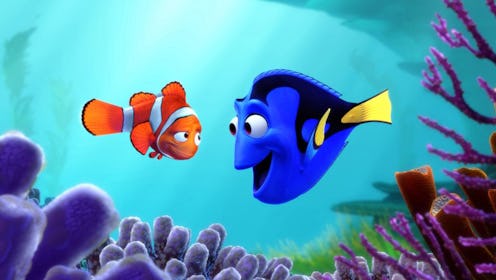Entertainment
'Finding Dory' Spotlights An Important Subject

One of the best things about Pixar is how the studio is never afraid to broach big, adult topics, despite their movies being aimed at kids. Toy Story tackled the pain of growing up and making friends, Inside Out dealt with depression, and now, Finding Dory spends much of its runtime focusing on mental disability and the idea of raising a child with a disability. And unlike the other Pixar movies, which feature their more serious themes in subtle ways meant primarily for adults to pick up on, Finding Dory places the issues surrounding Dory's disability front and center, meant to be understood and discussed by audiences of all ages.
Some Finding Dory spoilers ahead. The fact that the heroine of this film has a mental disability is not new to Finding Dory; the first movie in the franchise, Finding Nemo, featured the character's short-term memory loss heavily. Yes in that movie, Dory's disability was played mostly for comic relief, while in Dory, her memory issues are the film's primary subject matter. When Dory realizes that she might know where her long-lost parents are and sets out to find them, her memory loss greatly impedes her journey and causes her emotional distress. She's devastated that she has little memory of her parents and likely caused their separation by forgetting where she lived, and she gets easily frustrated with herself for "being such a Dory."
Meanwhile, flashbacks to Dory's childhood show just how hard it must've been for her parents to raise a daughter with such a severe impediment. Dory's parents are loving and patient, constantly devising new ways to test their child's memory and telling her frequently how much they adore her, but it's also clear that they're deeply worried about Dory's future. One heartbreaking scene shows the duo crying over their daughter, with Dory's mom asking her husband if Dory will ever be able to make it on her own, without the two of them to provide her constant support and care.
It's a hugely emotional scene, but what makes moments like that even more impactful is how unusual it is for any movie, let alone a kids' movie, to attempt to realistically portray what caring for someone with a disability is like. It's a heavy subject, and Pixar wouldn't be faulted for shying away from some of the darkest details, but choosing not to is hugely commendable. Dory's issues, and her parents' worries, will resonate with all viewers, regardless of how they live their own lives, and teach them an important message. As Finding Dory director Andrew Stanton told SlashFilm, Dory's struggle is intended to be universal. Said Stanton,
"I feel like most people have something about themselves that they see as a big flaw and that they’ve never been able to change about themselves. And I think the key is not often that you can conquer it, that you can get rid of it, but it was more as a how do you conquer it? How do you own it? How do you turn that into an asset? And I think that’s a very universal thing. And it works for disabilities. It works for handicaps, but it also works for just how you see yourself as imperfect. And that I liked. And that naturally came from just trying to deal with Dory."
While the challenges Dory faces in Finding Dory are unique to her situation, her attitude about handling them — and the care her parents have for her while trying to keep her safe — contains lessons all viewers can learn from. Like Inside Out , in which Riley's methods of coping with her unhappiness resonate with any viewer who's dealt with sadness in their life, Finding Dory's focus on overcoming obstacles and caring for loved ones will most certainly be prompting serious discussion among all who see the film.
Images: Disney/Pixar